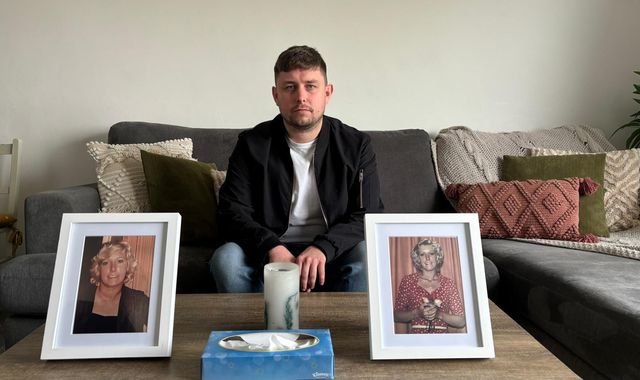Anne Short died on New Year’s Eve, only a few months after she was diagnosed with cancer.
Her son Elliot, 30, from Newport, South Wales, says the grieving process was made harder after having to wait eight weeks to hold her funeral.
“Quite frankly, it’s ridiculous, when you’re already going through all this pain and suffering as a family,” he told Sky News.
“You can’t move on, you can’t do anything, you can’t arrange anything, you can’t feel that they’re at peace, you can’t put yourself at peace, because of a process that’s been put in that nobody seems to know anything about at the moment.”
That process has been introduced by the government to address “concerns” about how causes of death were previously scrutinised, following high-profile criminal cases such as those of Harold Shipman and Lucy Letby.
Up until last September, causes of death could be signed off by a GP, but now they have to be independently scrutinised by a medical examiner, before a death certificate can be issued.
‘I felt helpless’
Mr Short said he was ringing “twice a day” for a progress update, but that it was “going through too many sets of hands”.
Until the death certificate was issued, Ms Short’s body could not be released into the care of the funeral director.
“The main stress for me was knowing that she was up there [at the hospital] and I couldn’t move her, so I felt helpless, powerless,” he said.
“I felt like I’d let her down in a lot of ways. I know now, looking back, that there’s nothing that we could have done, but at the time it was adding a lot of stress. I just wanted her out of there.”
‘Something has to be done’
Mr Short fears there’s a risk the new process might defeat its purpose.
“There’s other people that I know that have lost since, where it’s been in a care home or something like that, where they haven’t been happy with the care they’ve had, but they haven’t raised that because you’re in this bubble of grief and you just want to get it done,” he said.
“Something has to be done about that because I think it just drags on the grief and there’s obviously a danger then of it being against the reasons why they’re trying to do it.”
Arrangements after the death of his father less than two years ago was a “much easier process”, according to Mr Short.
“I lost my father as well 15 months before, so we went through the process prior to this coming in and we had the death certificate, he died at home, but we had it within three days,” he added.
‘State of limbo’
James Tovey is the sixth generation of his family running Tovey Bros, a funeral director in Newport.
He told Sky News that the delays were having a “huge impact” on the business and that the families they serve were being “left in a state of limbo” for weeks after their bereavement.
“I would say that most funerals will take place perhaps two to four weeks after the person’s passed away, whereas now it’s much more like four to six weeks, so it is quite a significant difference,” he said.
“It’s one thing on top of an already distressing time for them and we’re frustrated and upset for [the families] as much as anybody else and it’s just annoying that we can’t do anything about it.”
Mr Tovey said that the reform was “very useful” and he remained supportive of it.
“It’s just the delays. I’m sure they can do something about that over time, but it’s just waiting for that to happen, and I wish that could be addressed sooner rather than later,” he added.
“It does put pressure on other people, it’s not just ourselves, it’s pressure on the hospitals, on crematoria, on the registrar service and everyone else involved in our profession.
“But of course all of us we’re there to serve the families, and we’re just upset for them and wish we could do more to help.”
The National Association of Funeral Directors said some areas of England and Wales are experiencing much shorter delays than others, but has called for “urgent action”.
Rachel Bradburne, its director of external affairs, said the system was “introduced for all the right reasons” but that it was “not working as well as we need it to”.
“Funeral directors are relaying stories of delays, frustration, and bottlenecks on a daily basis, and urgent action is required to review and recalibrate the new system,” she added.
‘Unintended consequences’
Dr Roger Greene is the deputy chief executive of bereavement charity AtALoss.
He told Sky News that the delays were “one of the unintended consequences of what’s a well-intended reform of a system”.
“What has actually happened is that the number of deaths now requiring independent scrutiny has trebled,” he said.
“So in England and Wales in 2023, the last full year of data, there were nearly 200,000 deaths reported to a coroner, whereas there were 600,000 deaths.
“Now, what is the change in the process is that all deaths now need to be reported for independent scrutiny.”
Dr Greene said there may be ways the system could be “tweaked a little bit”, such as giving medical examiners the ability to issue an interim death certificate.
“We believe that people can process grief well if they’re given the opportunity and they’ve got a proper understanding,” he added.
“But the systems that we have in the country need to be able to work as well with that diversity of faith and culture.”
‘Vital improvements’
Jason Shannon, lead medical examiner for Wales, told Sky News he recognised “the importance of a seamless, accurate and timely death certification process”.
“Medical examiners are one part of the wider death certification process and were introduced to give additional independent safeguards as well as to give bereaved people a voice, which they hadn’t had before,” he added.
“Medical examiners have no role in determining where the body of a family’s relative is cared for and except in a minority of deaths where a coroner needs to be involved, that decision should be one that a family is fully empowered to make in a way that is best for them.”
A Welsh government spokesperson said they “would like to apologise to any families who have experienced delays in receiving death certificates”.
The government said it was working with the lead medical examiner and the NHS in Wales “to understand where the delays are” and how to provide bereaved families with “additional support”.
Read more from Sky News:
Families feel impact of spiralling funeral costs
Calls for funeral sector to be regulated
A spokesperson for the Department of Health and Social Care said it recognised there were “some regional variations in how long it takes to register a death”.
They added that the changes to the death certification process “support vital improvements to patient safety and aim to provide comfort and clarity to the bereaved”.





























